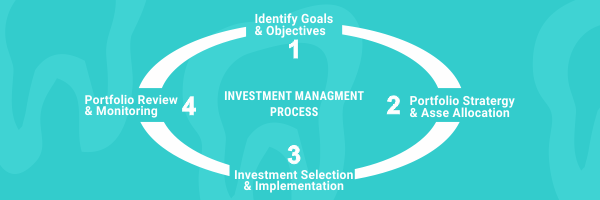
The importance of a professional management team
If you are planning to invest in dentistry, a professional management team can help you to hit the right chords. Here’s how –

In Investment Management, a group of executives works with the CEO of a company to set and oversee the strategy of the company. Depending on the type of organization and team structure,
Management teams can meet weekly, monthly, or quarterly. It is usually composed mainly of subordinates who report directly to the top manager.
What is investment management?
Not only do the investment managers entail buying and selling, but it also entails the administration of financial assets and other investments. Management involves banking, households, tax guidance, and tax difficulties, as well as developing short-term and long-term strategies for purchasing and selling portfolio investments.
The phrase is most commonly used to describe the process of managing and trading stocks in an investment portfolio to attain a certain financial goal.
Simply put, the investment managers in US invest their clients' money. They make the right investment choices, from fast-growing high-risk stocks to safe but slow-growing bonds. The goal is to achieve the customer's desired return at a level of risk that is comfortable for the customer.
Investment management companies make every effort to create an investment portfolio for their clients, opening up new investment opportunities that are not otherwise available.
Investment managers work for all types of clients. Some are focusing on wealthy private investors. Others work with businesses, charities, foundations, or large corporations.
The Basic Idea of Professional Investment management
Professional investment management seeks to meet specified investment objectives on behalf of the customers for whom they are accountable. Individual and institutional investors, such as pension funds, retirement funds, governments, educational institutions, and insurance organizations, are among this clientele.

Asset allocation, financial statement analysis, stock selection, monitoring of current assets, portfolio strategy, and execution are all examples of investment management services.
Investment management might encompass not just portfolio monitoring, but also financial planning and advising services that are aligned with the client's other assets and life objectives.
Bonds, equities, commodities, and real estate are among the securities and financial assets that professional managers trade. Intangible assets, such as precious metals, commodities, and works of art, can also be managed by managers. Managers may assist dental investors in coordinating their investments with their plans, as well as asset allocation.
The Objective of a Professional Management Team
Professional management's overall goal is to effectively lead the company they lead and everything associated with it, as well as to design and implement acceptable plans for the business's future.

Team performance must also be greater than or equal to the sum of each individual's performance. The organization is stronger than the sum of its functions if management can exercise this impact.
It is the old concept of "1 plus 1 is equal to 3". In many cases, different members are responsible for different departments, and the presence of management teams must ensure that different parts of the organization work together.
Depending on the type of organization, the following tasks may also belong to the management team's objectives:
- Creating and Communicating Strategic Visions
- Combine the efforts and plans of all key functions to implement the organization's overall plans and strategies.
- Several transactional and bureaucratic approaches may be required to ensure a proper organizational governance model and structure.
- Risk analysis and management of the potential risks
- Monitor and respond appropriately to external factors
3 Main Tasks that a Professional Management Team will do for the investor
Find out what the client's financial goals are and how much risk they’re willing to take:
Important information is needed for investment management firms, such as how much their clients need to invest, how much they want back when they require access to their money, and how much they are ready to lose.
Keep an eye on possible investments:
Cash deposits and government bonds are among the options, as are equities of young enterprises with uncertain futures. A business that manages investments should be aware of the options and analyze the investment risk and return for each.
Make a plan for investing:
Every client needs an investment portfolio that is suited to their financial stability. A diversified portfolio, which includes investments in a variety of assets, reduces risk - in other words, you shouldn't put all your eggs in one basket.
An investment management firm's fundamental operational model is as follows. This can be accomplished in a variety of ways. Several investors' investment trusts may be managed by an investment management company. You may put your money into private equity. In addition, the firm is responsible for business growth and marketing, as well as IT, valuation, and accounting.
Why Investment Management is important for your Portfolio?
As we all know, identifying the best assets in the market is a full-time job. Unsurprisingly, people use investment businesses to do it for them. It may appear that hiring a portfolio manager is a luxury only the wealthy can afford or require.

Investment management, on the other hand, is about getting the most out of your money: regardless of how much money you have, it is critical to make sure that every dollar is maximized. This is something that an investment manager can assist you with.
Investment management is enlisting the help of reputable financial organizations to manage your portfolio and invest in profitable chances that may fulfill your requirements.
When you decide to handle your investments yourself, you normally start by hiring an investment manager or fund manager. A fund management company is sometimes known as a wealth management company or an asset management company. Depending on the sort of investment you're seeking or the institution with whom you've made contact. After understanding the needs of your financial portfolio, these investment managers will take the time to develop detailed strategies for investing and growing your funds. Investing in equities, mutual funds, real estate, and alternative assets are examples of this. They can manage your money once you have your agreement on strategies, costs, and terms.
The portfolio will thereafter be managed regularly by the investment manager for frequent review and discussion. Fees and related expenditures are paid following the investment agreement's provisions. If you want to cancel the contract and withdraw funds from a specific opportunity, you can do so under the same terms and circumstances as before.
What role does money management have in your investment career?
Consistent earnings:
Effective investment management contributes to the creation of a reliable source of income. Income-generating assets include stocks of firms that pay dividends to shareholders or term deposits that pay interest.
Unemployed persons, employees, and retirees may all benefit from systematic investment management, which increases the likelihood of economic stability in society.
Effective investment management is also a source of additional income, generating more cash to aid the national economy.
To raise funds:
The majority of people put money aside for eventual use. People with investment plans do not outlive their savings. Individual funds may find it difficult to grow with government bonds and fixed deposits.
As a result, whether in the short or long term, capital appreciation is only achievable with good investment management. It's critical to think about the greatest investment possibilities that will pay off handsomely. Although mutual funds have a high level of risk, they can provide better returns.
It lowers the tax burden:
Those with modest earnings pay significant taxes on their wealth and investment. When paying bills for diverse investment assets, paying minimal taxes decreases individual or company expenditures. The greatest method to keep wealth and money together and decrease tax obligations is via effective investment management.
Companies pay higher taxes on the interest and capital gains earned by the banks in which they invest, both of which may be minimized with good investment management.
Expatriates may discover that their low-tax assets are significantly taxed in their new place of residence. As a result, investment managers guarantee that investors' tax payments are reduced, resulting in financial stability.
Outperform the competition:
It's a good idea to be conservative or strive for an average rate of return while managing your investment portfolio. Although being aggressive can sometimes pay off, the chance of losing is just as great, if not more.
You have a higher chance of outperforming the market if you hire an investment manager. As previously said, this may be accomplished by assuming bigger risks that investment managers can effectively manage.
To beat the market, these organizations employ a variety of techniques. Investing in diversified portfolios, mutual funds, and hedge funds. Do not, however, put all your eggs in one basket.
Portfolio security:
There is no such thing as a safe market these days. Everything may change in a matter of seconds. Unexpected political events and environmental changes can shake ships at any time, and only those who plan will be able to survive.
In this circumstance, you may rely on an investment management firm in US to safeguard you. One of the tactics we may use to shield our investment portfolio from the market is volatility.
Concentrate solely on portfolio diversification, continual liquidity, leverage reduction, and the most comfortable investment.
Benefits of Automation:
The way we work has evolved as technology has grown. As a result, people's expectations are growing, and they expect to accomplish more in less time with less work. Thanks to process automation, investment management is no exception.
Moving, validating, and adjusting data are all part of this process, which results in more timely and accurate reports. This generally reduces expenses while also assisting with risk management and company agility.
You may want to do things your way when it comes to financial and wealth management because you feel no one cares as much as you, the owner. Investment managers, on the other hand, have a high reputation and may provide outstanding service. You can examine your investment more closely, but these investment managers can provide considerably greater safety, profits, and, most importantly, peace of mind. They are all you could want and possess the required abilities to allow you to sit and rest.
Professional Investment Management: Pros and Cons
While the investment management sector can offer substantial profits, it also comes with several significant challenges. Market behavior has a direct impact on investment manager performance.
Because of this direct relationship, a company's profitability is determined by market values. A considerable reduction in asset prices, especially when contrasted to the company's continuous and consistent operational costs, might result in a collapse in the company's bottom line.
Moreover, during bad times, customers might be impatient and market-focused, and even above-average fund performance may not be enough to keep their portfolio afloat.
Advantage:
- Expert research
- Constant vigilance
- The ability to time and beat the market
- The ability to safeguard your wealth during downtime
Cons:
- High fees
- Profit fluctuates depending on the market
The sector has also experienced competition from two more sources since the mid-2000s:
- Robo-advisors are on the rise, a digital platform that offers automated, algorithm-based asset allocation and investing methods
- Exchange-traded funds (ETFs) with benchmark portfolios are available
Because human fund managers are only required to make a few investment decisions, this last hurdle exemplifies passive management. Except for the programmer who creates the algorithm, no humans are used in the first challenge.
As a consequence, both may charge far less than human money managers. According to some studies, however, these lower-cost options will frequently outperform actively managed funds in terms of total or overall returns, owing to their lack of high costs.
Due to the pressures of this simultaneous rivalry, investment management organizations must attract bright and intelligent individuals. Some clients assess the success of individual investment managers, while others assess the company's overall performance.
Not just how much money its customers gain in good times, but how much money they lose in bad times, is one of the most telling indicators of an investment management firm's ability.
What makes a management team successful?
A management team should be given the authority to administer the company. Although top management may have more veto power or supervision, it is vital to empower the leadership team to lead the firm. This degree of empowerment fosters a greater sense of duty and accountability, two notions that may significantly boost team productivity.

In addition, if the leadership team can accomplish this, the company will be less reliant on the leader. This improves efficiency while also lowering the possibility of the leader leaving for whatever reason. For a while, a leaderless company with a strong and empowered leadership team can work rather effectively.
Choosing a Professional Management Team
Investors must decide which sort of investment manager they require. This is likely to be determined by where they are in the financial planning process. An investor who is just starting to save, for example, may not require the services of a portfolio manager. She'd be better off working with a Certified Financial Planner (CFP) who can educate her on the fundamentals of retirement planning. An investor who earns after saving and wishes to invest in negotiable securities, on the other hand, can contact a portfolio management firm.
A professional background check of investment managers will identify any previous complaints and confirm that the manager has the appropriate skills and expertise. On their websites or in brochures, most investment and fund managers outline their investing philosophy. Investors must decide if this mindset (and amount of risk) is compatible with their objectives.
The investment manager must be conveniently available and consider the client's demands. Investors can feel free to contact their short-term investment manager to personalize the service as their financial circumstances change.
Investors must assess and evaluate the investment manager's performance. Investors need to examine investment performance over at least five years to assess investment managers' performance in various market circumstances. It's also a good idea to compare their performance to that of their peers to see where they fall short of the mark.
Some experts believe that an investment manager should have skin in the game, which implies that his pay should be proportional to his success. However, this isn't always the best option, as it might increase the amount of risk a manager must take to meet the benchmark line's returns.
When comparing investment managers, investors should look at the charge structure. The cost of an investment manager is determined by the type of investment property. Higher-cost investment managers are typically better than lower-fee investment managers, and investors should be careful if the investment manager's charge structure is too low. Management fees, performance fees, custody fees, and commissions are common fees and expenditures for portfolio managers.
In a nutshell, the leadership team's role is to oversee the organization's operations as well as to develop and implement a strategic plan. It is usually organized around the direct reports of top management and meets weekly, monthly, or quarterly. A management team that is enabled to truly run the organization, with the leader as one of the members rather than the ultimate in command of everything, can be more productive.
To learn more about the Professional investment management, reach out to us at contact@dentalinnovation.fund or visit our website https://dentalinnovation.fund/